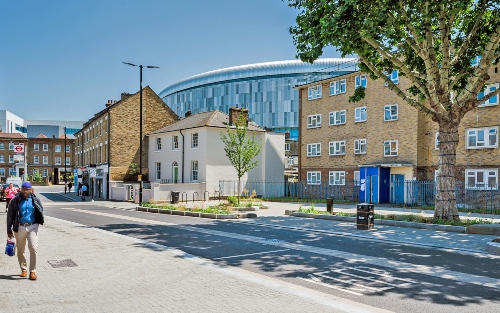
The synergy of permeable paving and street trees should now be a major consideration for local authorities in addressing climate change while delivering SuDS. Important new techniques applicable to all urban areas – including adopted roads – are exemplified in a new case study from Interpave exploring urban realm regeneration projects in Tottenham, London.
Completed in 2018, the regeneration of White Hart Lane in north Tottenham, by muf architecture/art, was a pilot designed using ‘Healthy Streets’ principles. These aim to create: 'Streets that feel pleasant, safe and attractive. Streets where noise, air pollution, accessibility and lack of seating and shelter are not barriers … streets with seating, shade and greenery, and reduced dominance of vehicles by designing for slower vehicle speeds.’ The project delivers these aspirations and was one of the first to use the ‘Healthy Streets’ indicator as a metric.
Multifunctional permeable paving
But it also applies innovative sustainable drainage (SuDS) techniques introduced by design collaborators Robert Bray Associates. This approach reduces flooding and pollution of the hidden Moselle River through the integration of bioretention raingardens to collect and treat polluted road runoff. In addition, extensive concrete block permeable paving (CBPP) surfaces not only act as SuDS elements – attenuating and treating rainwater runoff – but also enable essential air/CO2 exchange and optimised water supply for tree roots, using a range of techniques.
A focal point of the scheme is a new pocket park, enabled by relocation of a bus stop and removal of extensive asphalt paving. The park is separated from the road by bioretention raingardens, intercepting runoff from the whole width of the ‘side-hung’ carriageway which acts as a catchment. It also includes long planters to accommodate mature and new trees, and other green infrastructure, incorporating seating. This also enabled de-paving around a mature but suffocated and asphalt-locked Plane tree.
 Love Lane, which runs perpendicular to White Hart Lane in front of the new landmark Underground station, is now a concrete block permeable paved, adopted highway. CBPP can also accept runoff from White Hart Lane and other impermeable surfaces. At two points, structural tree pits span the full width below the road surface connecting road-narrowing tree planters on each side, in readiness for future planting. Based on the ‘Stockholm Solution’ for urban tree planting, the deep structural soil zones form sumps which are hydraulically connected to the coarse graded aggregate sub-base of the permeable paving.
Love Lane, which runs perpendicular to White Hart Lane in front of the new landmark Underground station, is now a concrete block permeable paved, adopted highway. CBPP can also accept runoff from White Hart Lane and other impermeable surfaces. At two points, structural tree pits span the full width below the road surface connecting road-narrowing tree planters on each side, in readiness for future planting. Based on the ‘Stockholm Solution’ for urban tree planting, the deep structural soil zones form sumps which are hydraulically connected to the coarse graded aggregate sub-base of the permeable paving.
Healthier resilient street trees
This means that in heavy or prolonged rain, once percolated runoff begins to move laterally along the interface between the sub-base and subgrade, it moves toward the structural tree pits where it begins to be attenuated. Once the pits fill to the level of the base of the road sub-base, the attenuation and infiltration spread out over the whole road zone.
This pattern of flow and attenuation means that trees benefit from rainwater collected from an extended catchment, making them healthier and more resilient to drought. Although initially unfamiliar with the structural tree pits, with support and advice the installation contractors soon became comfortable and are now installing them elsewhere.
At the renovation of Broad Lane Square in south Tottenham, the same designers take forward these principles with further innovations. In particular, ‘inverted raingardens’ protect existing trees and new green infrastructure, supplied with a gradual supply of clean water from extensive CBPP catchments.
Permeable paving in harmony with trees
Concrete block permeable paving and street trees have been proven to work together in synergy. CBPP – whether full-construction with sub-base or applied as an overlay on an existing impermeable road base – can collect rainfall away from the canopy and convey it to the tree. It can then simply discharge horizontally into a raingarden, with overflow into existing adapted gulleys. The raingarden stores water during heavy rain for SuDS, retains soil moisture during dry weather and provides additional water quality ‘polishing’, as well as irrigation.
Alternatively, CBPP can be used over standard tree pits, proprietary tree planters, Stockholm System or other structural soil installations, enabling irrigation and simple air/carbon dioxide exchange essential to trees – without additional reservoirs or pipes. CBPP also avoids tree root disruption common with other paved surfaces. Concrete block permeable paving technology will prove invaluable in delivering the street trees with long-term maintenance now demanded by the National Planning Policy Framework.
Chris Hodson is consultant to the trade body Interpave
More information and case studies are available via: www.paving.org.uk












